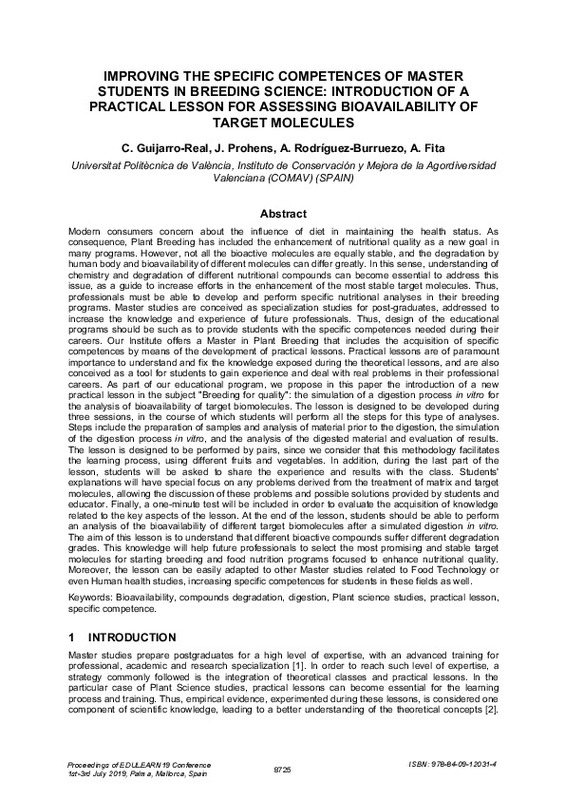JavaScript is disabled for your browser. Some features of this site may not work without it.
Buscar en RiuNet
Listar
Mi cuenta
Estadísticas
Ayuda RiuNet
Admin. UPV
Improving the specific competences of Master students in Breeding Science: introduction of a practical lesson for assessing bioavailability of target molecules
Mostrar el registro sencillo del ítem
Ficheros en el ítem
| dc.contributor.author | Guijarro-Real, Carla
|
es_ES |
| dc.contributor.author | Prohens Tomás, Jaime
|
es_ES |
| dc.contributor.author | Rodríguez Burruezo, Adrián
|
es_ES |
| dc.contributor.author | Fita, Ana
|
es_ES |
| dc.date.accessioned | 2022-02-11T08:06:24Z | |
| dc.date.available | 2022-02-11T08:06:24Z | |
| dc.date.issued | 2019-07-03 | es_ES |
| dc.identifier.isbn | 978-84-09-12031-4 | es_ES |
| dc.identifier.issn | 2340-1117 | es_ES |
| dc.identifier.uri | http://hdl.handle.net/10251/180738 | |
| dc.description.abstract | [EN] Modern consumers concern about the influence of diet in maintaining the health status. As consequence, Plant Breeding has included the enhancement of nutritional quality as a new goal in many programs. However, not all the bioactive molecules are equally stable, and the degradation by human body and bioavailability of different molecules can differ greatly. In this sense, understanding of chemistry and degradation of different nutritional compounds can become essential to address this issue, as a guide to increase efforts in the enhancement of the most stable target molecules. Thus, professionals must be able to develop and perform specific nutritional analyses in their breeding programs. Master studies are conceived as specialization studies for post-graduates, addressed to increase the knowledge and experience of future professionals. Thus, design of the educational programs should be such as to provide students with the specific competences needed during their careers. Our Institute offers a Master in Plant Breeding that includes the acquisition of specific competences by means of the development of practical lessons. Practical lessons are of paramount importance to understand and fix the knowledge exposed during the theoretical lessons, and are also conceived as a tool for students to gain experience and deal with real problems in their professional careers. As part of our educational program, we propose in this paper the introduction of a new practical lesson in the subject "Breeding for quality": the simulation of a digestion process in vitro for the analysis of bioavailability of target biomolecules. The lesson is designed to be developed during three sessions, in the course of which students will perform all the steps for this type of analyses. Steps include the preparation of samples and analysis of material prior to the digestion, the simulation of the digestion process in vitro, and the analysis of the digested material and evaluation of results. The lesson is designed to be performed by pairs, since we consider that this methodology facilitates the learning process, using different fruits and vegetables. In addition, during the last part of the lesson, students will be asked to share the experience and results with the class. Students' explanations will have special focus on any problems derived from the treatment of matrix and target molecules, allowing the discussion of these problems and possible solutions provided by students and educator. Finally, a one-minute test will be included in order to evaluate the acquisition of knowledge related to the key aspects of the lesson. At the end of the lesson, students should be able to perform an analysis of the bioavailability of different target biomolecules after a simulated digestion in vitro. The aim of this lesson is to understand that different bioactive compounds suffer different degradation grades. This knowledge will help future professionals to select the most promising and stable target molecules for starting breeding and food nutrition programs focused to enhance nutritional quality. Moreover, the lesson can be easily adapted to other Master studies related to Food Technology or even Human health studies, increasing specific competences for students in these fields as well. | es_ES |
| dc.description.sponsorship | Carla Guijarro-Real is grateful to the Ministerio de Educación, Cultura y Deporte of Spain for financial support by means of a predoctoral FPU grant (FPU14-06798). | es_ES |
| dc.language | Inglés | es_ES |
| dc.publisher | IATED | es_ES |
| dc.relation.ispartof | Edulearn19 Proceedings | es_ES |
| dc.rights | Reserva de todos los derechos | es_ES |
| dc.subject | Bioavailability | es_ES |
| dc.subject | Compounds degradation | es_ES |
| dc.subject | Digestion | es_ES |
| dc.subject | Plant science studies | es_ES |
| dc.subject | Practical lesson | es_ES |
| dc.subject | Specific competence | es_ES |
| dc.subject.classification | GENETICA | es_ES |
| dc.subject.classification | BIOQUIMICA Y BIOLOGIA MOLECULAR | es_ES |
| dc.title | Improving the specific competences of Master students in Breeding Science: introduction of a practical lesson for assessing bioavailability of target molecules | es_ES |
| dc.type | Comunicación en congreso | es_ES |
| dc.type | Artículo | es_ES |
| dc.type | Capítulo de libro | es_ES |
| dc.identifier.doi | 10.21125/edulearn.2019.2168 | es_ES |
| dc.relation.projectID | info:eu-repo/grantAgreement/MECD//FPU14%2F06798/ES/FPU14%2F06798/ | es_ES |
| dc.rights.accessRights | Abierto | es_ES |
| dc.contributor.affiliation | Universitat Politècnica de València. Departamento de Biotecnología - Departament de Biotecnologia | es_ES |
| dc.description.bibliographicCitation | Guijarro-Real, C.; Prohens Tomás, J.; Rodríguez Burruezo, A.; Fita, A. (2019). Improving the specific competences of Master students in Breeding Science: introduction of a practical lesson for assessing bioavailability of target molecules. IATED. 8725-8731. https://doi.org/10.21125/edulearn.2019.2168 | es_ES |
| dc.description.accrualMethod | S | es_ES |
| dc.relation.conferencename | 11th International Conference on Education and New Learning Technologies (EDULEARN 2019) | es_ES |
| dc.relation.conferencedate | Julio 01-03,2019 | es_ES |
| dc.relation.conferenceplace | Palma de Mallorca, España | es_ES |
| dc.relation.publisherversion | https://doi.org/10.21125/edulearn.2019.2168 | es_ES |
| dc.description.upvformatpinicio | 8725 | es_ES |
| dc.description.upvformatpfin | 8731 | es_ES |
| dc.type.version | info:eu-repo/semantics/publishedVersion | es_ES |
| dc.relation.pasarela | S\392534 | es_ES |
| dc.contributor.funder | Ministerio de Educación, Cultura y Deporte | es_ES |








